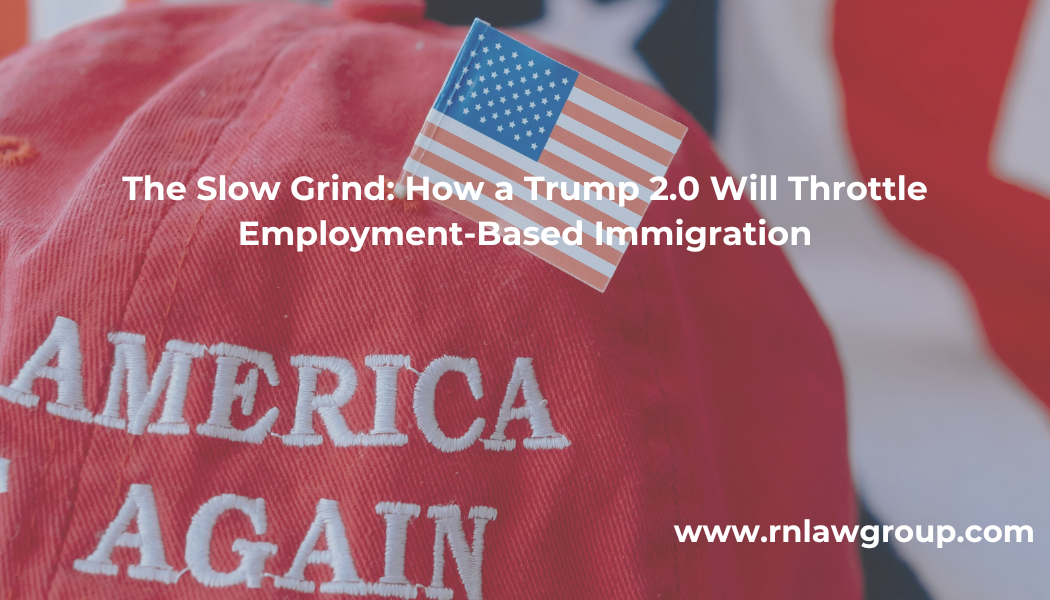
The Slow Grind: How a Trump 2.0 Will Throttle Employment-Based Immigration
As we meet the reality of a second Trump administration, employers, immigrants, and immigration practitioners must prepare for significant shifts in U.S. Citizenship and Immigration Services (USCIS) policy and adjudication trends. Given the administration’s previous hostility toward legal immigration, we can expect a renewed focus on unreasoned, restrictive, and burdensome bureaucratic measures which serve no one. These policies will likely lead to increased processing times disguised as heightened scrutiny and “extreme vetting.” Employment-based immigration pathways are expected to face considerable obstacles, making it crucial for applicants and employers to strategize accordingly.
From impulsive policy changes via social media to executive orders with little legal weight, a second Trump administration is likely to reinstate aggressive immigration restrictions. Employment-based visas, including the H-1B program and employment-based green cards, will likely face heightened evidentiary requirements and increasingly narrow interpretations of eligibility criteria. While courts ruled many of these restrictive policies unlawful during the previous Trump administration, they were still used to deter legal immigration under the guise of protecting American jobs—despite clear economic evidence that high-skilled immigrants are essential to sustaining growth in critical industries.
How a Second Trump Administration Could Impact Employment-Based Immigration
The chilling effect of these policies was particularly severe in employment-based categories, where unpredictable adjudications, arbitrary denials, and prolonged delays disrupted hiring and retention for many companies. If these measures return, businesses that rely on foreign talent—especially in STEM fields—must be prepared to adjust hiring strategies, explore alternative immigration pathways, and anticipate legal challenges to counter restrictive adjudications.
Beyond USCIS policy changes, regulatory rulemaking may once again be weaponized to undermine legal immigration. The previous administration attempted to redefine key visa and green card eligibility criteria, impose stricter labor market tests, and revoke work authorization for H-4 spouses of H-1B holders. While many of these efforts failed due to poor execution, a more prepared second-term Trump administration could pursue these changes more effectively. The elimination of discretionary relief mechanisms, restrictions on premium processing, and additional barriers to permanent residency could further complicate the immigration landscape.
Slower Processing Times and Increased Scrutiny
A well-documented strategy to hinder employment-based immigration is to drastically slow processing times. For instance, before Trump took office in 2017, it took approximately two months to obtain a Labor Certification from the Department of Labor. Today, that process takes nearly 18 months. Similarly, the approval time for a Form I-140 (Immigrant Petition for Alien Worker) has increased from a few weeks to 6–8 months since 2019. These delays create uncertainty for both employers and foreign workers, impacting long-term workforce planning.
Another anticipated development is an increase in Requests for Evidence (RFEs) and Notices of Intent to Deny (NOIDs)—tactics previously used by the Trump administration to slow down adjudications and discourage applicants. During Trump’s first term, RFEs were frequently used to question whether highly technical positions required a bachelor’s degree or to challenge employment relationships, even in cases where job requirements were clear. Employers seeking foreign talent should expect intensified scrutiny and work closely with legal teams to avoid unnecessary denials.
Mandatory Green Card Interviews and Visa Backlogs
Employment-based green card applicants should also prepare for the potential return of mandatory USCIS interviews—a policy introduced during Trump’s first term that significantly increased backlogs and processing delays. Before this change, employment-based green card interviews were rare, but their reintroduction served little purpose other than to slow the process and artificially limit visa availability.
Moreover, with slower approvals, we can expect continued growth in visa backlogs and delays in the Visa Bulletin, further extending wait times for employment-based green cards. These bureaucratic slowdowns create uncertainty for foreign workers and employers, limiting the U.S. economy’s ability to attract and retain top global talent.
H-4 Work Authorization and Other Policy Reversals
Another likely policy shift is the revocation of work authorization for H-4 visa holders, a move aggressively pursued by the first Trump administration but ultimately stalled due to legal challenges. If revived, this policy could force thousands of skilled spouses—many of whom work in critical industries—out of the workforce, further harming American businesses and families.
How Employers and Immigrants Can Prepare
With these anticipated policy shifts, both foreign nationals and their employers must stay informed, prepare strategic filings, and explore alternative immigration options to navigate the challenges ahead. Employers should be proactive in securing visas, advocating for their foreign workers, and, when necessary, pursuing litigation to challenge unjust administrative barriers. Legal practitioners will need to ensure thorough documentation, anticipate heightened scrutiny, and be prepared to counter restrictive adjudications.
A second Trump administration could introduce sweeping changes to employment-based immigration, making it essential for stakeholders to act early, stay vigilant, and develop contingency plans to mitigate potential disruptions. The time to prepare is now.
By Ryan A. Wilck, Partner and Attorney at Law

Ryan Wilck is a Managing Partner and attorney at Reddy & Neumann, P.C. with over a decade of US immigration law experience, enthusiastic and proactive in his approach assisting clients and their employees through the various phases of the permanent residency a/k/a Green Card process. “Concilio et labore” is not only the motto of Ryan’s favorite sports club but is also his life’s motto; all things come through wisdom and effort. Ryan is passionate about gaining the trust of his clients by utilizing a relentless and detail-oriented approach to understand their specific goals and concerns, hoping to instill a sense of confidence and stability. Whatever your immigration problem or interest, he and his team will find a solution, through wisdom and effort. Reddy & Neumann, P.C. has been serving the business community for over 20 years and is Houston’s largest immigration law firm focused solely on employment-based business immigration. We work with employers and their employees, helping navigate the complex immigration process efficiently and cost-effective.
We are committed to assisting our clients with navigating the complex PERM Labor Certification (ETA 9089 and other challenging immigration matters as an accomplished immigration law firm in Houston, Texas. Our team is here to offer the direction and support you require, whether you’re a company trying to hire top talent or a foreign worker seeking to develop a career in the United States. To find out more about how we can help you with your immigration issues, get in touch with us right away.
